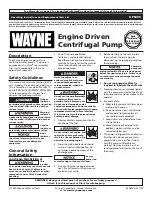
5
-Petrol is extremely flammable and explosive under certain conditions.
Fuel trapped in the cylinder may eject from the spark plug opening.
-ENSURE that the petrol is only stored in an approved storage container.
-DO NOT refuel the engine while it is in operation or hot.
-DO NOT operate or refuel the engine in a confined area without adequate ventilation.
-DO NOT refuel the engine in the vicinity of sparks, a naked flame or smoking.
-DO NOT overfill the fuel tank and avoid spilling petrol when refueling. Spilled petrol or
petrol vapor may ignite. If spillage occurs, ensure that the area is dry before starting the
motor.
-ENSURE that the fuel tank cap is securely fitted after refueling.
-Carbon monoxide exhaust gases from engine driven units can cause death in confined
spaces.
-ALWAYS wear approved hearing protection, as excessive noise can lead to temporary or
permanent loss of hearing.
-Protective goggles and a dust mask should be worn when working in a dusty environ-
ment. Protective clothing and footwear may also be desirable when working with hot
mix bitumen.
-Store the machine properly in a clean, dry place.
1.3 Operator Safety while using Internal Combustion Engines
-DO NOT smoke when refueling the engine or operating the machine.
-DO NOT refuel a hot or running engine.
-ALWAYS keep away from all hot or spark-generating objects when refueling the engine.
-ALWAYS refill the fuel tank until the machine has cooled, and in a well-ventilated envi-
ronment.
-DO NOT spill fuel when refueling the engine.
-ALWAYS take care to use the right type of fuel.
-ALWAYS inspect the fuel leakage regularly.
-NEVER perform any work on the machine while it is running. Before working on it, stop
the engine and disconnect the spark plug wire to prevent accidental starting.
-Avoid prolonged breathing of exhaust gases.
-ALWAYS transport and handle fuel only when contained in approved safety containers.
-Avoid touching or leaning against hot exhaust pipes.
-Allow engine to cool before performing any repairs or service.






































